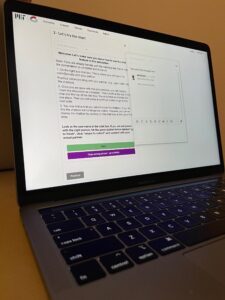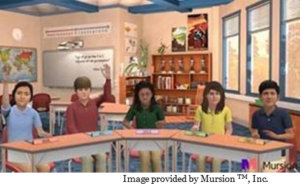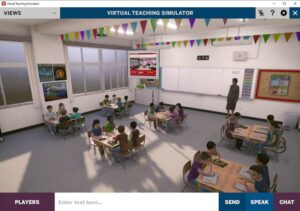About Online Practice Suite
Online Practice Suite
The Online Practice Suite (OPS) provides opportunities to practice certain aspects of argumentation-focused discussions. It was designed to allow a purposeful decomposition of complex teaching into smaller components which can be practiced with greater intensity and then re-integrated into the complex assemblage that makes up the ambitious teaching practice of facilitating argumentation-focused discussions.
The three approximations of practice that comprise the OPS can be thought of as a coherent set of scaffolds to support PSTs’ improvement in facilitating argumentation-focused discussions. The activities are intentionally designed to gradually build up PSTs’ experiences as they move from a focus on specific skills toward approximations that support them in integrating those skills within an online small group environment (ABS) to an immersive virtual reality context involving multiple small groups which more closely mimics the challenges of real classroom teaching (VTS).
Online Practice Suite Activities

Focused Practice Spaces (FPS) are simulations designed to support preservice teachers (PSTs) in practicing individual skills to facilitate argumentation-focused discussions. FPS activities focus on developing one skill with one or two students. There are two types of FPS activities in the OPS project: Eliciting Learner Knowledge (ELK) and Teacher Moments (TM). In ELK, two PSTs role play a teacher and a student and engage in a text-based chat with the goal of understanding the student’s ideas about a topic. In TM, the PST reviews written work from two students and plans an argumentation-based discussion based on the students’ ideas. before moving to a more complex activity. FPS (ELK/TM) are developed by the Teaching Systems Lab (TSL) at MIT.
 In the Avatar-Based Simulation (ABS), preservice teachers (PSTs) have an opportunity within the MursionTM environment to practice facilitating a small-group, argumentation-focused discussion about a mathematics or science topic with five student avatars in an online simulated classroom. The student avatars can respond in real-time to the teacher’s and each other’s questions, prompts, and comments during the simulated discussion. The ABS involves a human-in-the-loop, called a simulation specialist, who uses specialized equipment to sound and respond like elementary or middle school students during the discussion. Prior to the discussion, the PSTs are given access to a written document providing them with information about the student learning goal for the mathematics or science discussion along with details about activities the students completed prior to the discussion, copies of the students’ written work, and resources to learn about the features and examples of high-quality argumentation-focused discussions.
In the Avatar-Based Simulation (ABS), preservice teachers (PSTs) have an opportunity within the MursionTM environment to practice facilitating a small-group, argumentation-focused discussion about a mathematics or science topic with five student avatars in an online simulated classroom. The student avatars can respond in real-time to the teacher’s and each other’s questions, prompts, and comments during the simulated discussion. The ABS involves a human-in-the-loop, called a simulation specialist, who uses specialized equipment to sound and respond like elementary or middle school students during the discussion. Prior to the discussion, the PSTs are given access to a written document providing them with information about the student learning goal for the mathematics or science discussion along with details about activities the students completed prior to the discussion, copies of the students’ written work, and resources to learn about the features and examples of high-quality argumentation-focused discussions.
 In this project, the Virtual Teaching Simulator (VTS) provides preservice teachers (PSTs) with an opportunity to practice facilitating small-group and whole-class argumentation-focused discussions about a mathematics or science topic with eight student avatars in a virtual reality (VR) environment. The motivation for VTS is to allow PSTs multiple opportunities to rehearse various pedagogical moves without disrupting learning for real children. The student avatars in VTS are played by live actors who are trained to respond as elementary school students to the teacher’s and each other’s questions, prompts, and comments. Prior to the discussion in the VTS classroom, PSTs are given access to a written document explaining the learning goal of the mathematics or science discussion, copies of the students’ written work, and resources to learn about the VTS environment and features and examples of high-quality argumentation-focused discussions. Our goal is to support PSTs in developing confidence in their mathematics and science teaching as well as building expertise in facilitating argumentation-focused discussions.
In this project, the Virtual Teaching Simulator (VTS) provides preservice teachers (PSTs) with an opportunity to practice facilitating small-group and whole-class argumentation-focused discussions about a mathematics or science topic with eight student avatars in a virtual reality (VR) environment. The motivation for VTS is to allow PSTs multiple opportunities to rehearse various pedagogical moves without disrupting learning for real children. The student avatars in VTS are played by live actors who are trained to respond as elementary school students to the teacher’s and each other’s questions, prompts, and comments. Prior to the discussion in the VTS classroom, PSTs are given access to a written document explaining the learning goal of the mathematics or science discussion, copies of the students’ written work, and resources to learn about the VTS environment and features and examples of high-quality argumentation-focused discussions. Our goal is to support PSTs in developing confidence in their mathematics and science teaching as well as building expertise in facilitating argumentation-focused discussions.